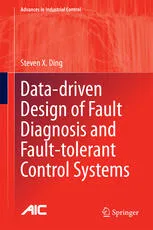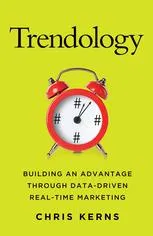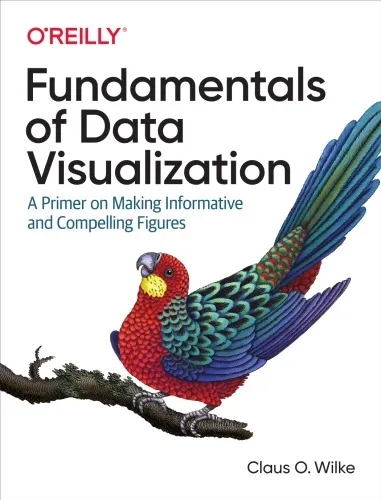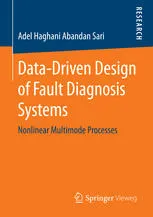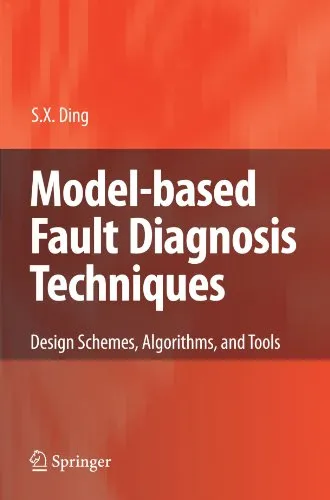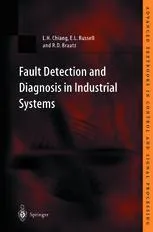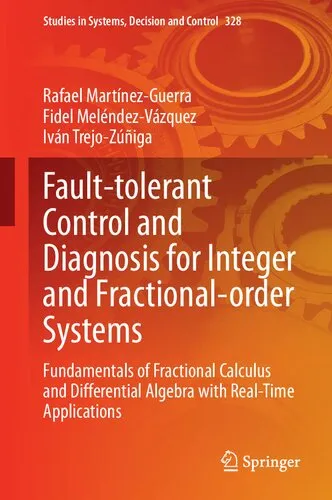Data-driven Design of Fault Diagnosis and Fault-tolerant Control Systems
4.5
بر اساس نظر کاربران

شما میتونید سوالاتتون در باره کتاب رو از هوش مصنوعیش بعد از ورود بپرسید
هر دانلود یا پرسش از هوش مصنوعی 2 امتیاز لازم دارد، برای بدست آوردن امتیاز رایگان، به صفحه ی راهنمای امتیازات سر بزنید و یک سری کار ارزشمند انجام بدینکتاب های مرتبط:
معرفی کتاب: Data-driven Design of Fault Diagnosis and Fault-tolerant Control Systems
کتاب Data-driven Design of Fault Diagnosis and Fault-tolerant Control Systems نوشتهی استیون ایکس دینگ یک راهنمای کامل و بینظیر در زمینه تشخیص خطا (Fault Diagnosis) و کنترل مقاوم در برابر خطا (Fault-tolerant Control) با رویکرد مبتنی بر داده است. این اثر به بررسی عمیق مفاهیم علمی پیچیده در این حوزه میپردازد و آنها را به صورت عملی و کاربردی برای مهندسان، محققان و دانشجویان ارائه میدهد.
خلاصه کتاب
این کتاب یک مسیر مشخص و جامع برای طراحی سیستمهای مقاوم و تشخیص خطا با استفاده از تکنیکهای Data-driven فراهم میکند. در دنیای امروز که سیستمهای پیچیده و پیشرفته در حال استفاده وسیع در صنعت هستند، تشخیص سریع خطاها و تطبیق سیستم با تغییرات ضروری است. کتاب با بهرهگیری از مدلهای ریاضی، تحلیل دادههای سیستم و روشهایی مثل Machine Learning و Signal Processing، شما را با ابزارهای کاربردی مواجه میکند تا بتوانید خطاها را با دقت بالا تشخیص داده و عملکرد سیستم را حتی در مواقع بروز خطا حفظ کنید. ساختار کتاب به گونهای است که از مفاهیم پایه آغاز شده و تا روشهای پیشرفته و کاربردهای صنعتی ادامه مییابد.
نکات کلیدی
- درک عمیق از مفاهیم Fault Diagnosis و Fault-tolerant Control.
- بررسی روشهای Data-driven و اهمیت آنها در مقایسه با روشهای مبتنی بر مدل.
- تکنیکهای Machine Learning و Signal Processing در تشخیص و مدیریت خطا.
- مطالعات موردی واقعی و کاربردهای صنعتی برای طراحی سیستمهای مقاوم در برابر خطا.
- رویکردهای ترکیبی بین تئوری و کاربرد برای رسیدن به نتایج مطلوب در پروژههای مهندسی.
نقلقولهای مشهور از کتاب
"The true power of fault-tolerant control lies in its ability to adapt and evolve in dynamic and uncertain environments."
"Diagnosis is more than just identifying the problem; it's about understanding its cause and impact to minimize risks."
"Data often holds the key to solving the most challenging problems in engineering, as long as you know how to interpret it."
چرا این کتاب مهم است
اهمیت این کتاب در ارائه رویکردهای نوین Data-driven در حوزههایی نظیر هوش مصنوعی، مهندسی سیستمها، و کنترل مقاوم نهفته است. دنیای مدرن به طور مداوم به سمت استفاده از سیستمهای پیچیدهتر پیش میرود، و این کتاب ما را برای مقابله با چالشهای پیشرو آماده میکند. خواندن این کتاب به شما کمک میکند تا نه تنها درک بهتری از روشهای پیشرفته تشخیص و کنترل پیدا کنید، بلکه از تجربهها و مثالهای کاربردی برای پیادهسازی راهحلهای عملی نیز استفاده کنید. این امر آن را به منبعی بینظیر برای پژوهشگران، مهندسان طراح، و مدیران صنعتی تبدیل کرده است.
Introduction to "Data-driven Design of Fault Diagnosis and Fault-tolerant Control Systems"
"Data-driven Design of Fault Diagnosis and Fault-tolerant Control Systems" dives deep into the intricate and dynamic interplay of fault diagnosis and fault-tolerant control techniques within the field of modern systems engineering. Authored by Steven X. Ding, this book addresses the growing demand for robust, reliable, and intelligent control systems capable of maintaining performance despite faults and uncertainties. Combining rigorous theoretical frameworks with practical insights, this work serves as an authoritative guide for researchers, engineers, and professionals working in automation, control systems, and data science.
Detailed Summary of the Book
With technological systems becoming increasingly complex, ensuring their safe, reliable, and fault-resistant operation is paramount. "Data-driven Design of Fault Diagnosis and Fault-tolerant Control Systems" offers a comprehensive framework for addressing this challenge. The author leverages principles of data analytics, machine learning, and control theory to introduce methods for diagnosing faults in real-time and designing fault-tolerant control systems for industrial and real-world applications.
The book begins with an overview of fault detection, diagnosis, and tolerance within automated processes. It then delves into data-driven approaches, highlighting how sensor data and system logs can be harnessed to provide actionable insights. Throughout the book, detailed mathematical and statistical tools are explained with clarity, covering topics like residual generation, observer design, and fault prognosis.
A unique feature of this book is its emphasis on fusing model-based and data-driven methods. Rather than relying solely on pre-defined models, the author demonstrates how systems can benefit from adaptive and flexible solutions powered by data streams and machine learning. Practical case studies and simulation examples are woven into the narrative to contextualize theoretical findings, making the concepts accessible and applicable.
By the end of the book, readers will have an in-depth understanding of designing control systems that demonstrate robustness and resilience, ensuring smooth operation even in the presence of unexpected faults or external disturbances.
Key Takeaways
When reading "Data-driven Design of Fault Diagnosis and Fault-tolerant Control Systems", you'll gain valuable insights, including:
- An introduction to data-driven fault diagnosis methodologies and their applications in real-time monitoring.
- Theoretical and practical techniques for residual evaluation and thresholding to detect faults.
- Fusion of model-based and data-driven approaches for enhanced fault tolerance.
- Insights into artificial intelligence and machine learning techniques for fault prognosis.
- Hands-on examples and case studies to bridge the gap between theory and implementation.
Famous Quotes from the Book
This book is peppered with insights that encompass the essence of fault diagnosis and control system design. Here are a few standout quotes:
"A fault-tolerant system is not one that operates in the absence of problems but one that continues to function intelligently when issues arise."
"Data is more than a byproduct of operation; it is the cornerstone for building resilient systems."
"The roadmap to a reliable automated system lies in the synergy between theoretical frameworks and practical data exploitation."
Why This Book Matters
The increasing automation of industrial, transportation, and critical infrastructure systems necessitates fault diagnosis and fault-tolerant control as foundational elements of design. Complex systems are prone to faults that can lead to severe downtime, loss of productivity, and even safety hazards. This book provides essential tools for mitigating such risks and ensuring safe, reliable, and efficient system operations.
Steven X. Ding's work addresses the limitations of traditional model-based fault diagnosis techniques by integrating them with data-driven approaches. By doing so, it caters to the emerging fields of machine learning and data science, which are shaping the future of automation. Readers from academia, industry, and research domains will find this comprehensive guide invaluable in equipping themselves with the skills needed to design and implement cutting-edge fault diagnosis and fault-tolerant systems.
Beyond the theoretical implications, the practical insights provided make this book a must-read for engineers striving to create smarter, more resilient infrastructure, especially as Industry 4.0 and IoT continue to reshape the global landscape.
دانلود رایگان مستقیم
شما میتونید سوالاتتون در باره کتاب رو از هوش مصنوعیش بعد از ورود بپرسید
دسترسی به کتابها از طریق پلتفرمهای قانونی و کتابخانههای عمومی نه تنها از حقوق نویسندگان و ناشران حمایت میکند، بلکه به پایداری فرهنگ کتابخوانی نیز کمک میرساند. پیش از دانلود، لحظهای به بررسی این گزینهها فکر کنید.
این کتاب رو در پلتفرم های دیگه ببینید
WorldCat به شما کمک میکنه تا کتاب ها رو در کتابخانه های سراسر دنیا پیدا کنید
امتیازها، نظرات تخصصی و صحبت ها درباره کتاب را در Goodreads ببینید
کتابهای کمیاب یا دست دوم را در AbeBooks پیدا کنید و بخرید
1351
بازدید4.5
امتیاز0
نظر98%
رضایتنظرات:
4.5
بر اساس 0 نظر کاربران
Questions & Answers
Ask questions about this book or help others by answering
No questions yet. Be the first to ask!
